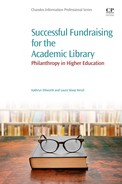Cases
The university press
Abstract
Often housed in the libraries, the university press offers a unique development opportunity. Donors can support publishing projects as well as digital collections. In addition to journals, a scholarly press often includes digital repositories of published materials representing a specific topic or research area.
Keywords
Digital repository; University press; Scholarly publishing; Digital collections
Not all universities have a press and not all presses reside within the library. However, if they do, they represent another great case for philanthropic giving for the right prospect. There are two ways to think about the press in terms of philanthropic support, depending on the specific structure for each university. Broadly speaking, most university presses will be divided on some level between what is considered “scholarly publishing” and publishing for the public.
Most alumni and prospects really don’t understand what goes on in a university press. Many won’t even be aware of it at all. If they are, the common assumption is that the university press publishes the work of faculty on campus. As a general rule, that is actually far from the truth. Most presses have a defined specialty depending on the journals they hold or an area of expertise at the university. To begin setting your fundraising strategy for the press, it is important to investigate its list of publications to determine areas of focus or trends. Pay close attention to book series or journals. For example, if the press publishes several journals on nursing-related scholarship, nursing alumni start to emerge as potential donors in your prospect pool. In the case of journals, gift funds can be created to supplement journal production. Even better is a book series. Books are more compelling to donors than scholarly journals in most cases, and sponsorships for volumes in a series with a meaningful alignment can be an interesting opportunity that appeals to some donors.
The university press is an area that is beginning to get funding from donors interested in managing the massive amounts of information that are being collected due to digital communication and publishing. Because these presses focus primarily on scholarly publishing, they don’t necessarily compete with mainstream publishing. However, due to the way mainstream publishing has influenced the market, it’s more important than ever for university presses to deliver their products in a similar fashion. Mike Scutari explains, “The proliferation of digital technology has created a seemingly limitless amount of information at our fingertips. It has also created a bunch of white noise. This problem is particularly acute in the university publishing world, as publishers try to compete with for-profit houses to attract ever-distracted readers glued to their iPads, Tablets, insert-digital-white-noise-device-here. It's too much to process.” (Scutari, 2015).
One of the best opportunities to engage donors in press projects is university history or projects about notable alumni. These are the kinds of projects that some presses will do as a part of their publishing strategy or sometimes as a one-off to celebrate a historic moment or anniversary. They offer a good opportunity to engage a large community without a publishing affinity but with a strong interest in the subject matter and the product. A project focused on a historical figure tied to the university may provide an opportunity for a single donor with a strong interest in the subject or history in general. In many cases, an author of such a book may very well be a graduate of the university and have an existing pool of supporters who may be willing to invest in a book project. This is an opportunity for a major gift or even a collaborative gift or donor circle. For large, university- level publications, a well-publicized crowd-funding campaign could be leveraged to cover the publishing overhead and go far to promote future sales once the work is ready for distribution.
Another aspect of a typical university press is the digital repository. If your press has one of these open access collections, it is a way to engage alumni who have alignment to the subject of the collection. This support is positioned much like any other collection opportunity. Often repositories are corporate resources. They may be records from professional associations, multiyear data collections for a specific topic, or journal or newspaper publications. Whatever the focus of the collection, these can reach beyond the alumni pool into a professional community or other stakeholder group. For libraries, access to information is at the core of their mission, so providing resources for free, beyond the scope of the university environment, is not only an important service but one that illustrates the larger value of the academic library for the community at large.
The open access position is powerful for donors. In the world of scholarly publishing, scholars are often required to pay high costs for downloads. This is a highly debated issue in the library field and something that the large foundations funding higher education are becoming more interested in. The case for giving in this case is assisting universities in finding solutions to making scholarship and research more accessible and less costly for researchers.
